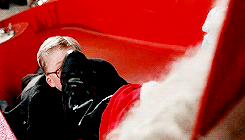So, I'm at the annual meeting of the American Society for Virology with two of my doctoral students and yesterday I had one of those moments that force you to log in and blog.
In the morning, my crew disappeared. They didn't come to some of the morning sessions and this raised a bit of anxiety in my heart. My two students were presenting back to back talks in the first session of the afternoon workshops and we had been preparing the talks already for a while. In fact, we had skept some of the sessions the day before to work on them. I felt that they both were ready, they had rehearsed their talks to a good extent and I thought that all they needed to do was to polish aa bit more the specific wording they were going to use in a couple of slides. But it was already really good the way it was. So, I felt confident and fairly relaxed about their presentations because I knew they were going to do OK. But when I noticed them missing in action, my heart all of the sudden skept a beat. I just felt a wave of adrenaline go through my veins, produce a chill in my back, and bring back emotions I had felt the first time I had one of my graduate students presenting our work. It was that sudden realization that I was not in control that produced a chill in my brain. When you are in control, you know that nothing bad is going to happen because you will make sure that nothing bad is going to happen. But when you are NOT in control, when somebody else is at the stearing weel, you know that you are not the one who defines the direction that the moving vehicle that your life turns into is going to take. Suddenly, you realize that nothing is in your hands, you know that anything that happens at that moment, the reputation of your scientific enterprise, the boldness of your research, the perceived strenght of your own science, is in someone else's hands. 1985 was the year I started my "scientific" career. That's when I commited myself to become a scientist (well, I had always known what I wanted to be, but that's the year I started my undergrad education, at age 16). More than 25 years of truly demanding work were in someone else's hands...well, perhaps not totally, but to some degree. The chill in my back turned into a memory. When I was a child, back in Colombia, I remember climbing this relatively tall mountain right next to the city where I was born. At some point on my way to the top, I remember turning around just to realize how high I was and how easy it would be to fall down. All the effort I had put getting to that point would be lost in just one second. That memory came to me like a flash. Fear. The most basic of the emotions. The one we share with all other vertebrates. It consumed me, even if for only a few seconds. Then, a soothing thought came to me, to rescue me, to save me: "If they are not here, it is not because they are not ready, it is not because they are insecure and overwhelmed by fear, it is because they want to make it perfect, because they know they can make it perfect, it is because they will make it great."
I decided that they didn't need me. No more criticism. No more coaching. It was all in their hands. They had each other to help each other. And I trusted them. I knew at that moment that this was not really anything new. I realized something that should've been obvious all this time: I've been doing exactly that for more than a while. I've been trusting my doctoral students, my master students, my undergraduate students, with everything I've been fighting for. And I've been doing that every day since I became a professor.
I was joined by them at lunch. They came my way and we made it to the auditorium where they were going to present their work. They seemed confident. And I felt confident. Then, they presented their work. First Jason. Then Katie. They both did great. Every word, every statement, every movement appeared to be perfectly orchestrated to deliver the right message. After each one of them, multiple hands were raised. People were anxious and willing to ask questions. Questions are the indirect way to indicate that your work matters, that you intrigued your audience, that they paid attention, that your message was heard. And there were plenty of hands asking for a chance to ask a question.
I felt proud. I felt safe. I felt thrilled. But more than anything else, I felt that the road I had taken up to that point had been worth it. Life is a nothing but a second. And everyone's life is easily forgotten in the infinite array of lives that converge in our world. But I felt that I had changed, at least to some degree, Jason and Katie's lives. And that gave a deeper meaning to my own existence.
Being a PI is so much more than just writing grants, trying to be scientifically creative, staying on top of the newest research, keeping up with the newest methods, trying your best to write decent papers, looking at your data with no attachment and no bias, trying to keep an open mind about what matters and what seems to be just noise....being a PI is so much more. It is about trust, about guidance, about developing life-long interactions, about making sure everyone gets the best, ....being a PI is so awesome in so many ways, I can't see myself doing anything else at any point in life.


